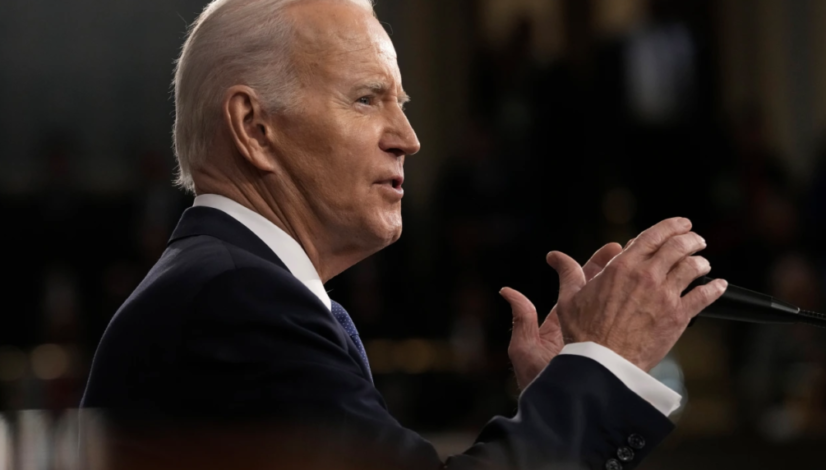Bad news: Biden’s agenda will drive inflation higher

President Biden claims he is laser focused on combatting inflation. His policies say otherwise.
First off, there was little suggestion in Biden’s rambling State of the Union address that exorbitant federal spending – blamed by many economists for sky-high prices – would come down any time soon.
In addition, Biden’s proposed Buy American program will drive infrastructure costs higher, just as it did under Presidents Obama and Trump.
Add to those two price-inflating factors Biden’s ongoing dedication to unionization, which drives up labor costs, his war on fossil fuels, which has discouraged higher oil and gas production, and his push to increase regulations on businesses, and the Federal Reserve will have its hands full bringing inflation down to 2 percent.
Biden has yet to admit the connection between spending and price inflation. In his speech, he again passed the buck, saying, “Inflation has been a global problem because the pandemic disrupted our supply chains and Putin’s unfair and brutal war in Ukraine disrupted energy supplies as well as food supplies, blocking all that grain in Ukraine.”
See? It’s all the fault of COVID-19 and Vladimir Putin.
And yet, voters connect those dots, and blame Biden’s blowout budgets for the decades-high hit to middle class real incomes. Consequently, the president dishonestly brags about bringing our deficits down even though the decline is from emergency levels to still elevated totals. We are nowhere near back to “normal.”
In his speech, Biden promised his coming economic plan “is going to cut the deficit by another $2 trillion.” And yet, his address was peppered with expensive new promises.
For example, he continues to advocate forgiving certain student loans, which the University of Pennsylvania’s Wharton School estimates will cost $361 billion. Biden is also demanding “family medical leave” and “affordable child care.” Who pays for that?
Biden also wants to re-up the child tax credit, which expired last year. The proposed extension of the benefit, which was greatly expanded (from $2,000 to $3,600 for young children via the $1.9 trillion American Rescue Plan), was estimated by the Peterson Foundation to cost $1.6 trillion over the next decade.
In the laundry list of ambitions outlined in the president’s speech, Biden also included an extended care program that will allow seniors and people with disabilities to stay in their homes, more Pell grants, pre-school for the nation’s three and four-year-olds, two years of free community college and a raise for public school teachers.
Biden says these programs are “fully paid for.” Will increasing the tax on stock buybacks or adopting a billionaire’s tax fund these large programs? It’s doubtful, and in any event those measures are not expected to pass a GOP House.
Biden also wants more money to fund new vaccines and treatments for future viruses. He wants to combat crime not through reversing the idiotic no-bail programs progressives have adopted in blue cities like New York, but rather by ratcheting up “more resources to reduce violent crime and gun crime, more community intervention programs, more investments in housing, education and job training.”
In a similar vein, he vows to stem the flood of illegal immigrants entering our country if only Congress would “pass my plan to provide the equipment and officers to secure the border.” And he wants to up support for veterans, helping them to afford housing and providing more job training.
Many of these programs are well-meaning, but they would add to our deficits. In addition, some, like forgiving student loans or the child tax credit, would help keep people from working, which is one of the key sources of inflation today.
Some 5.6 million Americans have disappeared from the workforce since January 2020. Since then, the population has expanded by 7 million, but only 1.4 million more people are employed. This is a problem.
Tight labor markets are driving wages higher, proving a speed bump to lowering inflation. The Atlanta Federal Reserve shows wages rose 6.1 percent in January on average, which was below the 6.7 percent jumpposted last August, but still a challenge to the Fed’s 2 percent inflation target.
Another big boost to inflation contained in Biden’s speech was the directive requiring that all the goods used in federally-funded infrastructure programs should be made in America.
During the first three quarters of 2022 the U.S. imported 27 percent of the lumber used in construction projects. Similarly, the U.S. imported an estimated 5.1 million metric tons of aluminum in 2022; in both cases businesses bought materials from overseas to save money. Prohibiting those sourcing options will drive construction costs higher.
President Obama incorporated a “Buy American” provision in his $800 billion stimulus program enacted to help the country recover from the financial crisis. At the time, it was criticized for raising costs and slowing projects; the number of wastewater projects, for instance, actually fell 30 percent in 2009 because of the complicated sourcing requirement. Eventually, Obama backed off the rule.
In 2017, President Trump revisited the Buy American concept, eliciting much the same push-back. The Peterson Institute at the time wrote about such regulations, “They are costly for taxpayers, they curtail exports, and they lose more jobs than they create.”
Its analysis concluded that the Buy American rule would “likely impose a cost of 5 to 10 percent on US taxpayers through inflated prices for public purchases. The elevated cost—essentially government waste—could exceed $100 billion annually.”
Biden probably thinks pushing the Buy American program will enhance his poor standing with blue-collar workers who have defected to the GOP. Instead of micro-managing U.S. businesses and programs, maybe he should unleash our productive energy industries to bring down gasoline prices, reduce – not increase – regulations that are making our companies less productive, buck the teacher unions and demand better educations for middle-class kids and drop the woke agenda that middle America hates.
Sadly, for all the president touts America’s “possibilities,” none of that is on the table.
Published on The Hill




